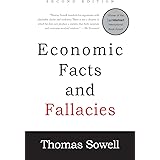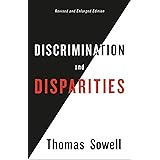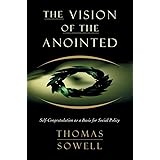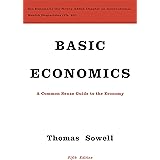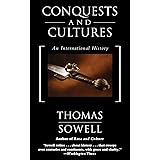Buy new:
$62.74$62.74
Save with Used - Good
$28.99$28.99
Ships from: Amazon Sold by: Martistore

Download the free Kindle app and start reading Kindle books instantly on your smartphone, tablet, or computer - no Kindle device required.
Read instantly on your browser with Kindle for Web.
Using your mobile phone camera - scan the code below and download the Kindle app.

OK
 Audible sample Sample
Audible sample Sample 


Intellectuals and Society Hardcover – January 5, 2010
Purchase options and add-ons
- Print length416 pages
- LanguageEnglish
- PublisherBasic Books
- Publication dateJanuary 5, 2010
- Grade level11 and up
- Reading age13 years and up
- Dimensions6.5 x 1.5 x 9.5 inches
- ISBN-10046501948X
- ISBN-13978-0465019489
The Amazon Book Review
Book recommendations, author interviews, editors' picks, and more. Read it now.
Frequently bought together

Similar items that may deliver to you quickly
Editorial Reviews
Review
“Sowell takes aim at the class of people who influence our public debate, institutions, and policy. Few of Sowell’s targets are left standing at the end, and those who are stagger back to their corner, bloody and bruised.”
Washington Times
“Mr. Sowell builds a devastating case against the leftist antiwar political and intellectual establishment."
About the Author
Product details
- Publisher : Basic Books; 1st edition (January 5, 2010)
- Language : English
- Hardcover : 416 pages
- ISBN-10 : 046501948X
- ISBN-13 : 978-0465019489
- Reading age : 13 years and up
- Grade level : 11 and up
- Item Weight : 1.4 pounds
- Dimensions : 6.5 x 1.5 x 9.5 inches
- Best Sellers Rank: #426,541 in Books (See Top 100 in Books)
- #1,566 in History & Theory of Politics
- #4,541 in Sociology (Books)
- Customer Reviews:
About the author

Discover more of the author’s books, see similar authors, read author blogs and more
Customer reviews
Customer Reviews, including Product Star Ratings help customers to learn more about the product and decide whether it is the right product for them.
To calculate the overall star rating and percentage breakdown by star, we don’t use a simple average. Instead, our system considers things like how recent a review is and if the reviewer bought the item on Amazon. It also analyzed reviews to verify trustworthiness.
Learn more how customers reviews work on AmazonReviews with images
-
Top reviews
Top reviews from the United States
There was a problem filtering reviews right now. Please try again later.
“With all your getting, get understanding.”
“Wisdom requires self-discipline and an understanding of the realities of the world, including the limitations of one’s own experience and of reason itself. The opposite of high intellect is dullness or slowness, but the opposite of wisdom is foolishness, which is far more dangerous. George Orwell said that some ideas are so foolish that only an intellectual could believe them, for no ordinary man could be such a fool.’’
Sowell clearly belongs this class of ‘intellectuals’.
However, he shines a light in a dark corner of the ‘intellectual’ mind . . .
“The great problem—and the great social danger—with purely internal criteria is that they can easily become sealed off from feedback from the external world of reality and remain circular in their methods of validation. What new idea will seem plausible depends on what one already believes. When the only external validation for the individual is what other individuals believe, everything depends on who those other individuals are. If they are simply people who are like-minded in general, then the consensus of the group about a particular new idea depends on what that group already believes in general—and says nothing about the empirical validity of that idea in the external world.’’
‘Sealed off from feedback’. Fellow ‘believers’ are not the real world.
“The ignorance, prejudices, and groupthink of an educated elite are still ignorance, prejudice, and groupthink—and for those with one percent of the knowledge in a society to be guiding or controlling those with the other 99 percent is as perilous as it is absurd. The difference between special knowledge and mundane knowledge is not simply incidental or semantic. Its social implications are very consequential. For example, it is far easier to concentrate power than to concentrate knowledge. That is why so much social engineering backfires and why so many despots have led their countries into disasters.’’
‘Easier to concentrate power than knowledge’. So true!
“John Stuart Mill, who epitomized the intellectual in many ways, expressed this view explicitly, when he said that the “present wretched education” and “wretched social arrangements” were “the only real hindrance” to attaining general happiness among human beings. Moreover, Mill saw the intelligentsia—“ the most cultivated intellects in the country,” the “thinking minds,” “the best and wisest”—as guides to a better world in their role of “those who have been in advance of society in thought and feeling.”
The scientific/industrial revolution conquered nature. Why not overcome human life the same way. Well . . .
“This has been the role of the intelligentsia, as seen by the intelligentsia, both before and after Mill’s time—that of intellectual leaders whose broader knowledge and deeper insights can liberate people from the needless restrictions of society. Jean-Jacques Rousseau’s famous declaration—
“ Man was born free, and he is everywhere in chains”
—summarizes the heart of the vision of the anointed, that social contrivances are the root cause of human unhappiness. This vision seeks to explain the fact that the world we see around us differs so greatly from the world that we would like to see. In this vision, oppression, poverty, injustice and war are all products of existing institutions—problems whose solutions require changing those institutions, which in turn requires changing the ideas behind those institutions. In short, the ills of society have been seen as ultimately an intellectual and moral problem, for which intellectuals are especially equipped to provide answers, by virtue of their greater knowledge and insight, as well as their not having vested economic interests to bias them in favor of the existing order and still the voice of conscience.’’
This is a great summary of the ‘vision of the anointed’! What is the correct word — hubris, arrogance, pride? Maybe — supercilious!
PART I -INTRODUCTION Chapter 1 -Intellect and Intellectuals
INTELLIGENCE VERSUS INTELLECT
IDEAS AND ACCOUNTABILITY
COMPETING CONCEPTS OF KNOWLEDGE
THE ROLE OF REASON
PART II -INTELLECTUALS AND ECONOMICS
Chapter 4 -Economic Systems
CHAOS VERSUS COMPETITION
ZERO-SUM ECONOMICS
PART III -INTELLECTUALS AND SOCIAL VISIONS
Chapter 6 -A Conflict of Visions
Chapter 8 -Arguments Without Arguments
“SIMPLISTIC” ARGUMENTS
“SOCIAL JUSTICE”
Chapter 9 -Patterns of the Anointed
“CHANGE” VERSUS THE STATUS QUO
ATTITUDES VERSUS PRINCIPLES
A SEALED BUBBLE
CRUSADES OF THE ANOINTED
PART IV -OPTIONAL REALITY
Chapter 10 -Filtering Reality
OBJECTIVITY VERSUS IMPARTIALITY
Chapter 11 -Subjective Truth
PART V -INTELLECTUALS AND THE LAW
Chapter 12 -Changing the Law
PART VI -INTELLECTUALS AND WAR
PART VIII -AN OVERVIEW
Chapter 20 -Patterns and Visions
Chapter 21 -Incentives and Constraints
THE SUPPLY OF PUBLIC INTELLECTUALS
THE DEMAND FOR PUBLIC INTELLECTUALS
Chapter 22 -The Influence of Intellectuals
Sowell leads reader up a smooth, safe path. However, he clearly marks the dangerous sections. Solid reasoning, abundance of facts and enlightening explanations.
Fit for both general and academic reader. Provides outstanding insight to the causes, puzzles of modernity. Even more, does not offer any real alternative.
The list has grown by one this year thanks to Thomas Sowell, and I do not make such a claim easily. While his much earlier masterpiece, Conflict of Visions (1987), could arguably be on the list as well, I believe that his newest book, Intellectuals and Society, is not just Sowell at his finest but is perhaps the very essence of conservative thinking at its finest. The book is remarkably readable, extremely practical, and most of all, is such a lethal combination of head shots and body blows to the parasite of modern intellectualism that one finishes the book feeling splattered by the damage Sowell has done.
At its core, the book seeks to explore the phenomena of public intellectuals who Sowell carefully defines as "people whose occupations deal primarily with ideas". There are extremely intelligent people in our society who we do not deem to be "intellectuals" - specialists who possess a particular expertise in a particular field. Sowell provides the important distinction that engineers and scientists and financiers, for example, while not considered to be "public intellectuals", are judged by external standards - by empirical notions of verifiability. Intellectuals, on the other hand, face no such external test. Rather, it is the mere acceptance their own peers provide them that defines their success. They are judged exclusively by internal criteria, devoid of methods of validation. Yet their ideas have consequences, and as Sowell demonstrates in every page of this 317-page delight, the ideas of the intelligentsia over the last century have largely been an unmitigated disaster. Often lethal and frequently incoherent, intellectuals have survived in the last 100 years despite the fruits of their labors. Sowell laments this development, questions its causes, and demonstrates its truth in crystal clear fashion. Intellectuals lack accountability for their disastrous ideas, aided and abetted by non-intellectual accomplices within the intelligentsia that share their unconstrained vision for humanity.
Sowell does not target the flaws of public intellectuals that may or may not exist within their particular field of specialization. The book calls these public intellectuals to the carpet for their espousing of ideas and policies to a wider audience than their field of study called for, carrying the same "air of authority" in the wider field that was outside of their field of expertise as they do within the more narrow field to which they claim some degree of knowledge. Sowell points out that "most non-intellectuals achieve public recognition or acclaim by their achievements within their respective areas of specialization, while many intellectuals could achieve comparable public recognition only by going outside their own expertise or competence." Public intellectuals feed off of a demand that is almost entirely self-manufactured. As Sowell has laid out in his aforementioned work, Conflict of Visions, the unconstrained vision of the left is one of an arrogant, elite, anointed - a vision that makes claim to the moral responsibility and intellectual ability to cure the world of its ills. The testing of this unconstrained vision through conventional and empirical validation methods has been devastating in its conclusiveness that the unconstrained vision has been a disaster. The challenge, though, is the lack of accountability that exists for these public intellectuals. Sowell makes clear that their vision is not only one for the world "as it exists and a vision of what it ought to be like, but it is also a vision of themselves as a self-anointed vanguard, leading toward that better world." For Sowell, "the role that they aspire to play in society at large can only be achieved by them to the extent that the rest of society accepts what they say uncritically and fails to examine their track record."
The real target of Sowell's book are those members of the "intelligentsia" who either make up these public intellectual frauds, or worse, serve as their willing accomplices. Judges in the legal system, politicians in government, journalists in media, and worst of all, academic charlatans in the academy, have all served as the support system for this age of public intellectuals promulgating their anointed vision to the world. Sowell meticulously walks through the effects intellectuals have had in 20th century economics, law, foreign policy, and media. He laments the attack on the very concept of truth itself that the intellectuals have launched, and again points out the self-serving nature of their vision.
Sowell is a brilliant thinker himself - an idea man - a scholar. But unlike the targets of Sowell's attacks, he does not claim that his expertise in socio-political thoughts exempts him from external validation tests should he branch out into other arenas of thought. Sowell invites external criticism. He holds himself to the standards that public intellectuals refuse to hold themselves to. And while Sowell is an ideologue, he is keenly aware that the repudiation of the unconstrained vision of the anointed - public intellectual leftism - is unlikely to take place as long as this vision maintains its dominance in our school system and modern media. The arrogance of collectivism and surrogate decision-making can be rebuffed in print (as Sowell does in decisive fashion), but the battle must be won where the battle is being fought. Sowell's book is a treasure for those who want to be armed when they engage this fight. The future of our civilization depends on those who hold to the constrained vision - the vision of the founders - taking this fight to the public square. The fight will not be won without Sowell's decimation of the likes of John Dewey, Bertrand Russell, Paul Ehrlich, and dozens of other blowhards whose ideas have represented indescribable agony for citizens of the 20th and now 21st centuries. But as Sowell makes painfully clear, the vision of the anointed is now the property of the teacher's unions and the New York Times. Conservatives have a lot of work to do.
I do not recommend doing anything else when you are done reading this review besides buying Sowell's book. Intellectuals and Society is the magnum opus of this man's life and career, and I have barely scratched the surface of what he accomplishes in this book. Read it. Encourage your kids to read it. And engage the fight. The arrogance of the self-anointed elites will not be defeated until we do.
See [...] for more
Top reviews from other countries
Sowell defines intellectuals as people whose occupations deal primarily with ideas, in particular that they deal in the ideas and do not apply them. Scientists and engineers are not intellectuals. Mathematicians are not, so that Bertrand Russell as a mathematician was not an intellectual, however when suggesting in 1937 that Britain should completely disarm, he was. George Bernard Shaw, one of the great playwrights, felt confident in saying in 1939, just one week before war broke out, “Herr Hitler is under the powerful thumb of Stalin, whose interest in peace is overwhelming. And everyone except myself is frightened out of his or her wits!” – he was a professional as a playwright but an intellectual in geopolitics.
What does it mean when someone we regard as brilliant, a genius, a mind so superior to ours, says or writes things so silly? One’s own intelligence seems so complex, but so changeable, puny, prone to error – we expect individuals of generally accepted great intellect somehow not to suffer these problems. Yet these demonstrably silly writings belie that confidence. Sowell separates thinkers into intellectuals, for whom far more knowledge and intelligence are available to some people than others, from those who emphasise specialization and social processes whose economic and social transactions draw upon the varied knowledge and experience of millions, past and present.
Apart from the “no skin in the game” aspect of an intellectual, Sowell identifies the moralising element, describing an “anointed intelligentsia, on the side of angels against the forces of evil” while ordinary unintellectuals have a “tragic vision [which] is a vision of trade-offs, rather than solutions, and a vision of wisdom distilled from the experiences of the many, rather than the brilliance of the few”. For example, payday loans, where Sowell bravely argues against e.g. the New York Times’ attractive and furious argument against them (denouncing payday loan providers’ “triple-digit annual interest rates, milking people’s desperation” and “profiteering with the cloak of capitalist virtue” and describing a 36 percent interest rate ceiling as something needed to prevent “the egregious exploitation of payday loans”.)
How could anyone decent argue against such obvious moral rightness? Sowell writes:
“The sums of money lent are usually a few hundred dollars, lent for a few weeks, with interest charges of about $15 per $100 lent. That works out to annual interest rates in the hundreds - the kind of statistics that produce sensations in the media and in politics. The costs behind such charges are seldom if ever investigated by the intelligentsia, by so-called ‘consumer advocates’ or by others in the business of creating sensations and denouncing businesses that they know little or nothing about. The economic consequences of government intervention to limit the annual interest rate can be seen in a number of states where such limits have been imposed. After Oregon imposed a limit of 36 percent annual interest, three quarters of its ‘payday loan’ businesses closed down. Nor is it hard to see why - if one bothers to look at facts. At a 36 percent limit on the annual interest rate, the $15 in interest charged for every $100 lent would be reduced to less than $1.50 for a loan payable in two weeks - an amount not likely to cover even the cost of processing the loan, much less the risks of making the loan. As for the low-income borrower, supposedly the reason for the concern of the moral elites, denying the borrower the $100 needed to meet some exigency must be weighed against the $15 paid for getting the money to meet that exigency. Why that trade-off decision should be forcibly removed by law from the person most knowledgeable about the situation, as well as most affected by it, and transferred to third parties far removed in specific knowledge and general circumstances, is a question that is seldom answered or even asked.”
The NYT’s “milking people’s desperation”, “profiteering with the cloak of capitalist virtue” and “egregious exploitation of payday loans” are examples of what Sowell calls “verbal virtuosity .. obscuring, rather than clarifying, rational analysis”. Would that analysis be so very difficult, in plainer words? If borrowers are assumed to have their wits, then laws or regulations would only be needed that prevented lenders using confusion (rather than outright fraud, which is already illegal) to hide loan costs or make them seem cheap. Given that one in ten of of us does not understand percentages, intellectuals’ focus on interest rates is probably misplaced, and borrowers must know more: the cost of the loan as well as its rate. If we wish something that protects borrowers too confused or incapable not to harm themselves with unrepayable loans, then legal, regulated lenders that cannot pursue defaulters with knuckle-crushers (and so have to accept defaults and factor them into loan interest, like any lender) are better than the loan sharks that Oregon-style restraints empower.
Where do these intellectuals come from and why are they there, advising, lecturing, haranguing? As one might perhaps expect from an economist, Sowell discusses Supply and Demand… of intellectuals. Why is there a supply? People in utilitarian fields’ results are their own fame – cars, medicine, smartphones, etc.) whereas:
“for intellectuals in general, where the primary constraint is peer response, rather than empirical criteria, currently prevailing attitudes among peers may carry more weight than enduring principles or the weight of evidence. This can produce patterns much like those found among another group heavily influenced by their peers - namely adolescents, among whom particular fashions or fads can become virtually obligatory for a given time, and later become completely rejected as passé, without in either period having been subjected to serious examination, either empirically or analytically.”
Among the hundred public intellectuals mentioned most often in the media, only eighteen are also among the hundred intellectuals mentioned most often in scholarly literature. Furthermore, most public intellectuals speak outside their expertise (for example Noam Chomsky, the brilliant linguist, whose LALR grammars are much less known to the public than his extravagant political utterances, or John Maynard Keynes, whose biographer wrote “he held forth on a great range of topics, on some of which he was thoroughly expert, but on others of which he may have derived his views from the few pages of a book at which he had happened to glance; the air of authority was the same in both cases”,) or else their expertise is something that can only be tested by other intellectuals, and not empirically.
The demand for intellectuals on the other hand is to an extent manufactured, due to an over-supply, by intellectuals, who put themselves endlessly forward, offering “solutions” to social “problems” or by raising alarms over some dire dangers which they claim to have discovered. Don’t forget that the demand for the output of non-intellectuals (cars, planes, medicine, etc.) is spontaneous in the public, whereas the demand for intellectuals has to be stimulated by this endless promotion.
How can a few intellectuals have such an effect on governments, public policy and the public at large? Sowell describes the “penumbra” of journalists, teachers, staffers to legislators or clerks to judges and other members of the intelligentsia, whose influence on the course of social evolution can be crucial. In the case of teachers:
“who lack either the inclination or the talent to become public intellectuals can instead vent their opinions in the classroom to a captive audience of students, operating in a smaller arena but in a setting with little chance of serious challenge. In such settings, their aggregate influence on the mindset of a generation may be out of all proportion to their competence—not simply in what they directly impart, but more fundamentally in habituating their students to reaching sweeping conclusions after hearing only one side of an issue and then either venting their emotions or springing into action, whether by writing letters to public officials as part of classroom assignments or taking part in other, more direct, activism”
That problem has become entrenched in that this learnt activism is often tested in university interviews; in Sowell’s robust words:
“As early as elementary school, students have been encouraged or recruited to take stands on complex policy issues ranging up to and including policies concerning nuclear weapons, on which whole classes have been assigned to write to members of Congress or to the President of the United States. College admissions committees can give weight to various forms of environmentalism or other activism in considering which applicants to admit, and it is common for colleges to require “community service” as a prerequisite for applicants to be considered at all—with the admissions committee arbitrarily defining what is to be considered a “community service,” as if, for example, it is unambiguously clear that aiding and abetting vagrancy (“the homeless”) is a service rather than a disservice to a community.”
Should schools teach views of complex issues a lot, a little, or not at all? In any measure proselytising must cut into teaching basics accurately, and undermine the difficult business for the pupil of learning and understanding basics and outside classes evaluating complex issues in the world, trying to apply the basics correctly rather than falling for the much easier and more pleasurable route of following our instincts or prejudices, or the urgings of furious and righteous public intellectuals, at which point the process becomes self-sustaining and fact-free.
What are the costs of all this intellectualism? How does one begin to calculate the costs of all the mistaken policy, the needlessly state-employed advisors, the subsidies, the deadweight loss of the mistaken interventions, etc.
Intellectuals and Society is an attractively written book, but more so a very well informed work, with strong arguments against the expensive, sanctimonious intellectual.







